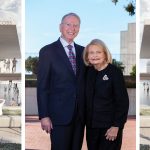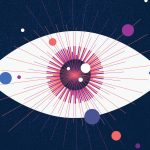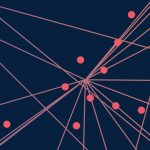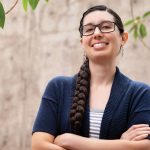Professor Janelle Ayres, head of the Molecular and Systems Physiology Laboratory and a member of both the Gene Expression Laboratory and the NOMIS Center for Immunobiology and Microbial Pathogenesis, was recognized for her contributions to advancing science through research by being named the inaugural recipient of the Salk Institute Legacy Chair. Through her pioneering work on host-pathogen interactions, Ayres has demonstrated that health is an active process, involving evolved physiological defense mechanisms, creating a new paradigm and field that she calls “the biology of health.” Elizabeth Keadle, a Salk alumna and member of the Board of Trustees, recently donated $1.5 million in matching funds to establish the endowed chair at the Institute.
Featured Stories
 Joan and Irwin Jacobs — A perfect matchJoan and Irwin Jacobs donate $100 million, a transformative gift, helping to launch Salk’s five-year, $500M philanthropic and scientific Campaign for the Future.
Joan and Irwin Jacobs — A perfect matchJoan and Irwin Jacobs donate $100 million, a transformative gift, helping to launch Salk’s five-year, $500M philanthropic and scientific Campaign for the Future. How computational biology is making us smarterThe Salk Institute is embracing the artificial intelligence revolution and inventing new ways to investigate life. Machine learning, deep learning and other AI techniques are being used to probe massive data sets, identify useful information and make accurate predictions.
How computational biology is making us smarterThe Salk Institute is embracing the artificial intelligence revolution and inventing new ways to investigate life. Machine learning, deep learning and other AI techniques are being used to probe massive data sets, identify useful information and make accurate predictions.  Dan Tierney – Biology Meets TechnologyDan Tierney is no stranger to big data. When Tierney founded a financial technology firm in the late 1990s, long before he joined the Salk Institute’s Board of Trustees, he was fascinated by emerging computational approaches that could crunch data and reveal hidden truths.
Dan Tierney – Biology Meets TechnologyDan Tierney is no stranger to big data. When Tierney founded a financial technology firm in the late 1990s, long before he joined the Salk Institute’s Board of Trustees, he was fascinated by emerging computational approaches that could crunch data and reveal hidden truths.
 Natalie Luhtala — Shaping pancreatic cancer research to have real world applicationsThis year, Staff Scientist Natalie Luhtala celebrates her 10-year work anniversary at the Institute. In her current role, she’s directing a project examining an elusive signaling pathway to identify new targets for treating pancreatic cancer.
Natalie Luhtala — Shaping pancreatic cancer research to have real world applicationsThis year, Staff Scientist Natalie Luhtala celebrates her 10-year work anniversary at the Institute. In her current role, she’s directing a project examining an elusive signaling pathway to identify new targets for treating pancreatic cancer. Laura Newman — From mitochondria to craft beer and backLaura Newman, a Salk postdoctoral researcher, fell in love with science in a lab in college and switched from a medical program to pursuing biochemistry and developmental biology. At Salk, her main focus is on how cells can recognize when they’re sick or damaged in order to activate the immune system for cell survival.
Laura Newman — From mitochondria to craft beer and backLaura Newman, a Salk postdoctoral researcher, fell in love with science in a lab in college and switched from a medical program to pursuing biochemistry and developmental biology. At Salk, her main focus is on how cells can recognize when they’re sick or damaged in order to activate the immune system for cell survival.






















































